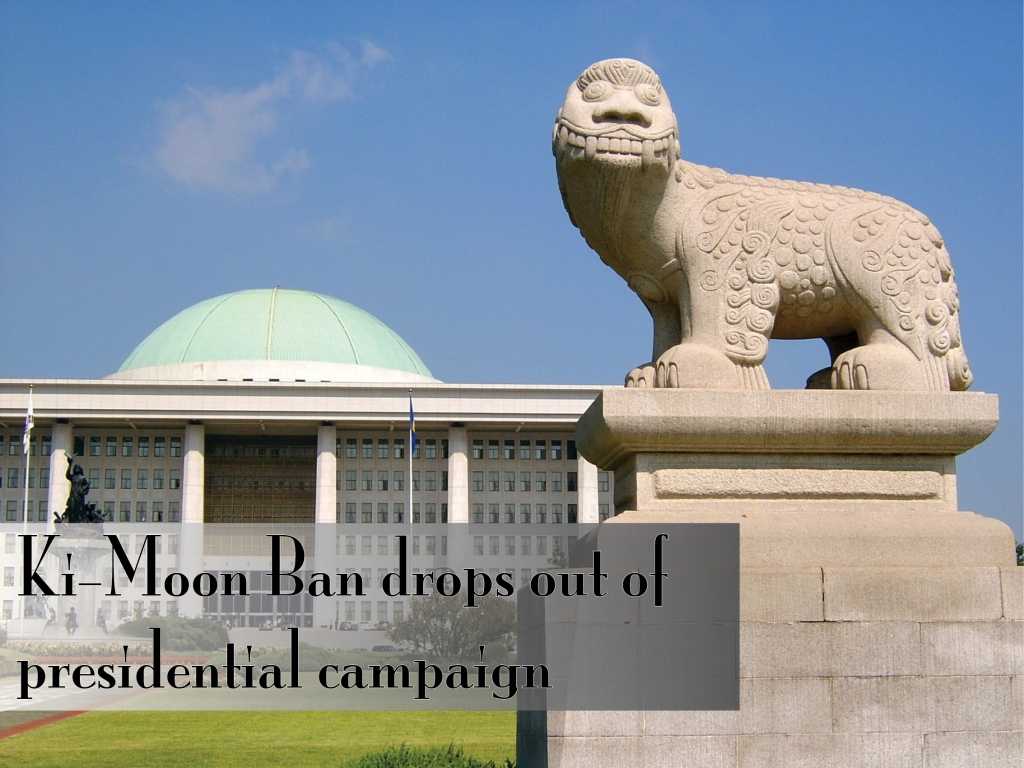Former Secretary-General of the United Nations Ki-moon Ban dropped out of the Korean presidential race on Feb. 1 following a series of criticisms by the media and public. Currently, opposition candidate Jae-in Moon leads in poll numbers, followed by unofficial candidate Kyo-ahn Hwan.
“It was quite surprising to see Ban stepping out of the presidential race especially since Ban wanted to run for President even before his term as the General-Secretary of the UN ended,” said Julie Song (11), MUN member. “Still, his popularity was on the decline ever since the Soon-shill Choi scandal and I don’t think that he could have won the presidency.”
Ban, as the front running candidate for the conservative Saenuri Party of which President Geun-hae Park is associated with, saw his poll ratings plummet following the recent scandal involving President Park. By the end of January, opposition candidate Moon of the liberal Minjoo Party pulled ahead with over 30 percent of votes while Ban lagged behind with barely 15 percent.
“I think there are a few reasons why Ban was not able to pull ahead in poll numbers, but the biggest cause may be his party allegiance,” said Andrew Lee (11), World History student. “Because of his party’s failures with President Park, many Koreans would not be as trusting of the Saenuri Party.”
Ban based his presidential campaign off of his experiences as the Secretary-General of the UN, citing how his efficiency in international politics would resolve issues including those posed by North Korea. However, opponents expressed skepticism over his ability to serve as president by stating that Ban’s lack of strong political affiliations would prove detrimental in the cutthroat arena of Korean politics. They also argued that his shifting stance on the issue of comfort women was a cause for concern. In addition, many denounced Ban’s presidential campaign as going directly against a UN resolution passed in 1946 which states that former Secretary-Generals should refrain from accepting a position in the government immediately after their retirement.
“I think that as a UN Secretary-General, Ban may lack the skills necessary to excel in domestic politics,” said Jeffrey Heo (11), MUN member. “Because much of his career was concentrated in resolving international issues and forming alliances with those abroad, he may lack both in the necessary connections and the knowledge of domestic politics to be a good president.”
In his withdrawal statement, Ban stated that his genuine commitment to lead the nation was being hindered by slanderous remarks from journalists and politicians, and that he found it “meaningless” to work alongside them. With Ban’s withdrawal from the presidential race, the Saenuri Party currently has no presidential candidate. Many believe that the party will select prime minister and acting president Hwan as their candidate, but an official statement has yet to be released.
“Still, I believe it would be hard for the Saenuri Party to win the election especially with the devastating President Park scandal,” said Jay Min (12), MUN chair. “The Saenuri Party, if they want any chance of winning, should distance themselves from President Park as much as possible and save face. If Hwan does decide to run, he must elevate the party as much as possible to win the presidency.”

